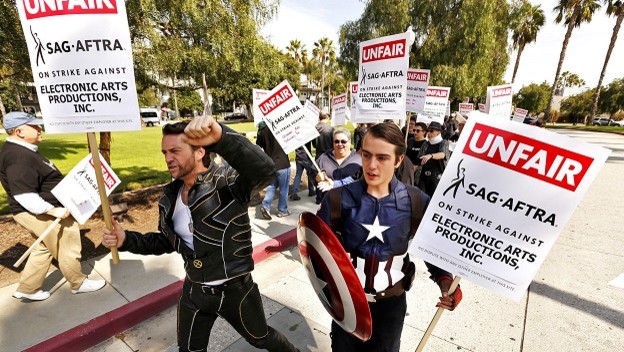You may have heard that there’s a strike going on in the video game industry. Members of SAG-AFTRA (the Screen Actors Guild & American Federation of Television and Radio Artists) who perform voiceover work for video games have declared that their working conditions and compensation are not commensurate with their labor. To this end, SAG-AFTRA engaged in negotiations with employers in the video game industry for over 19 months to secure updated contracts that more appropriately reflect the work its members perform. The current work model for voice actors is based on a contract that is over twenty years old, and does not account for sweeping changes in the industry that have taken place in the years since its establishment.
SAG-AFTRA officially went on strike on October 21. Their first demonstration was outside of Electronic Arts headquarters on October 24, and they plan to picket again on November 3 at WB Games, Inc. at Warner Bros. Studios. The strike stands in opposition to a group of video game employers that extends far beyond those two companies, including Disney Character Voices, Inc., Insomniac Games, Inc., Take 2 Interactive Software, and more. Participants are being asked to withhold their services from all struck employers to make the urgency of their demands clear.
The specific issues that SAG-AFTRA demands their employers address are listed in their official strike notice . Key among these are measures to provide contingent compensation for games that meet certain sales criteria, placing a hard limit on the amount of time actors spend doing especially stressful vocalizations (and increasing pay for this type of performance), and increased transparency in communicating specific project information. The strike also calls for stunt coordinators to be present whenever dangerous stunt work is performed. SAG-AFTRA points out that the guidelines for working with professional voice actors were established when the industry was still in its infancy, and that they no longer suffice under today’s standards.
My assessment? I’m not in a position to declare either side as definitively “correct” in this battle of wills and bills, but surely there’s some merit to re-evaluating a two-decade-old contract. The lack of transparency in performance agreements is a particularly critical issue, and one that is deeply entwined with the standard practices of most AAA game developers. The industry is notoriously opaque when it comes to discussing the game development process, and although strides have been made toward transparency in recent years, it remains common for voice actors to accept roles without knowing anything about their projects beforehand. This is not an isolated, antecedent issue; watch some of the English voice cast interviews for Final Fantasy XV, and you’ll hear multiple actors mention that they had no idea who they were playing until their work had already begun on the game.

(Photo credit: Al Seib / Los Angeles Times)
Furthermore, taking measures to reduce dangerous vocal stress seems like a no-brainer; tea and water aren’t enough to prevent or reverse permanent damage to actors’ vocal cords. Frankly, I’m vicariously offended that any employers would find that to be an adequate solution. Secondary compensation also sounds fair to me, considering how well many AAA games sell, although the specifics of the proposed payout scheme are beyond the range of my critique. Even if you don’t care about English voice acting in your games, it’s important to recognize that the people behind those performances deserve to be treated fairly for their work. You may disagree on the proposed terms of the strike or the reasons behind it, but the fact remains that this situation needs to be addressed, lest the games you want to play in the coming months be delayed, or worse, cancelled.
